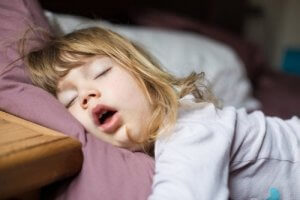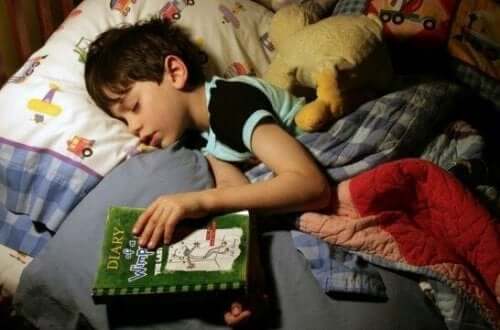The Stages of Sleep in Babies and Children

The stages of sleep in babies and children contribute to bodily regulation as well as repair and help control energy and body temperature. Therefore, it’s preferable for little ones to go at their own pace.
You’ll help your children rest better if you respect these stages of sleep. If you try to change them, you may even affect their development. During sleep, memories and learning are stored. Sleep strengthens the body and helps children mature both mentally and physically.
Eating frequently
The two stages of sleep in babies differ from the five stages of adult sleep. This is because a baby’s body needs frequent nourishment, which is why babies wake up during the night to eat and then continue sleeping. Sometimes, they open their eyes to seek their mother’s warmth.
The stages of sleep in babies and children
The varying stages of sleep depend on the baby or child’s age. Some sleep cycles are lighter, while others are deeper.
- In REM sleep, the brain remains active. This is a short period characterized by rapid eye movement. Babies are in a semi-alert state, which is why it’s easy for them to wake up. It usually lasts for about 90 minutes.
- Non-REM sleep is the opposite. This is a deep, quiet, and longer sleep stage. During the night, both alternate, which is why babies might wake up and then fall deeply asleep a few minutes later. This way, they’ll get the eight hours of rest they need.
These stages also depend on the child’s health and development. Teething, for example, can interrupt the stages of sleep.

According to age
As babies grow, REM sleep stages decrease. At two months, babies can sleep peacefully for one-hour periods and then eat when they’re hungry. Thus, they don’t distinguish day from night.
- Babies aged four months and above can sleep three to four hours straight. At six months, they’ll start sleeping for longer periods, but this won’t happen every night.
- At seven months, babies will be able to acquire other sleep stages until they experience a total of four. The latter is deep sleep. From eight to 24 months, babies prefer to sleep more, peacefully and deeply. Nightmares or noises will wake the baby, not hunger. The desire to speak or crawl may also ward off sleep.
- When babies are about to turn one, they begin to wake up for short periods of time. These arousals are considered a response to the alert state that human beings are permanently in. Children can experience them until they’re four years old and experts consider them normal. Often, they include sleep terrors, nightmares, or noise.
- Between the ages of three and six, children sleep like adults. They won’t wake up during the night unless they’re scared or sleepwalk. In these cases, they often ask their parents for company. Reading a story or singing to them are great options.
Respect children’s sleep patterns
To make sure these intervals don’t become a habit, don’t interrupt their sleep. You should know that it’ll be really hard to try to make your children fall asleep when they don’t need to. Sleeping at their own pace makes things easier and avoids tantrums. Thus, changing children’s sleep patterns is very harmful.
If babies don’t sleep well, they’ll suffer from future physical and mental problems. The importance of making sure that babies and children sleep well and enough has been demonstrated.

An ideal environment
You need to create an ideal sleep environment for children to be comfortable and sleep at their own pace. Make sure you’re aware of the moment when they wake up and when they want to sleep so they don’t establish their own routine.
You must respect the stages of sleep in babies and children. They’re all tailored to the baby or child’s bodily needs. Rest helps to repair and regulate the baby or child’s body. In addition, it helps organize knowledge and memories. Babies and children learn and mature while they sleep.
The stages of sleep in babies and children contribute to bodily regulation as well as repair and help control energy and body temperature. Therefore, it’s preferable for little ones to go at their own pace.
You’ll help your children rest better if you respect these stages of sleep. If you try to change them, you may even affect their development. During sleep, memories and learning are stored. Sleep strengthens the body and helps children mature both mentally and physically.
Eating frequently
The two stages of sleep in babies differ from the five stages of adult sleep. This is because a baby’s body needs frequent nourishment, which is why babies wake up during the night to eat and then continue sleeping. Sometimes, they open their eyes to seek their mother’s warmth.
The stages of sleep in babies and children
The varying stages of sleep depend on the baby or child’s age. Some sleep cycles are lighter, while others are deeper.
- In REM sleep, the brain remains active. This is a short period characterized by rapid eye movement. Babies are in a semi-alert state, which is why it’s easy for them to wake up. It usually lasts for about 90 minutes.
- Non-REM sleep is the opposite. This is a deep, quiet, and longer sleep stage. During the night, both alternate, which is why babies might wake up and then fall deeply asleep a few minutes later. This way, they’ll get the eight hours of rest they need.
These stages also depend on the child’s health and development. Teething, for example, can interrupt the stages of sleep.

According to age
As babies grow, REM sleep stages decrease. At two months, babies can sleep peacefully for one-hour periods and then eat when they’re hungry. Thus, they don’t distinguish day from night.
- Babies aged four months and above can sleep three to four hours straight. At six months, they’ll start sleeping for longer periods, but this won’t happen every night.
- At seven months, babies will be able to acquire other sleep stages until they experience a total of four. The latter is deep sleep. From eight to 24 months, babies prefer to sleep more, peacefully and deeply. Nightmares or noises will wake the baby, not hunger. The desire to speak or crawl may also ward off sleep.
- When babies are about to turn one, they begin to wake up for short periods of time. These arousals are considered a response to the alert state that human beings are permanently in. Children can experience them until they’re four years old and experts consider them normal. Often, they include sleep terrors, nightmares, or noise.
- Between the ages of three and six, children sleep like adults. They won’t wake up during the night unless they’re scared or sleepwalk. In these cases, they often ask their parents for company. Reading a story or singing to them are great options.
Respect children’s sleep patterns
To make sure these intervals don’t become a habit, don’t interrupt their sleep. You should know that it’ll be really hard to try to make your children fall asleep when they don’t need to. Sleeping at their own pace makes things easier and avoids tantrums. Thus, changing children’s sleep patterns is very harmful.
If babies don’t sleep well, they’ll suffer from future physical and mental problems. The importance of making sure that babies and children sleep well and enough has been demonstrated.

An ideal environment
You need to create an ideal sleep environment for children to be comfortable and sleep at their own pace. Make sure you’re aware of the moment when they wake up and when they want to sleep so they don’t establish their own routine.
You must respect the stages of sleep in babies and children. They’re all tailored to the baby or child’s bodily needs. Rest helps to repair and regulate the baby or child’s body. In addition, it helps organize knowledge and memories. Babies and children learn and mature while they sleep.
All cited sources were thoroughly reviewed by our team to ensure their quality, reliability, currency, and validity. The bibliography of this article was considered reliable and of academic or scientific accuracy.
- Congreso Argentino de Pediatría. Córdoba- Octubre 2006. El sueño en la infancia. Extraído de: https://www.sap.org.ar/docs/organizacion/comitesnacionales/ped_amb/Suenio.pdf
- Ignacio J. Cruz Navarro. (2018). Alteraciones del sueño infantil. Extraído de: https://www.aepap.org/sites/default/files/317-329_alteraciones_del_sueno_infantil.pdf
This text is provided for informational purposes only and does not replace consultation with a professional. If in doubt, consult your specialist.








